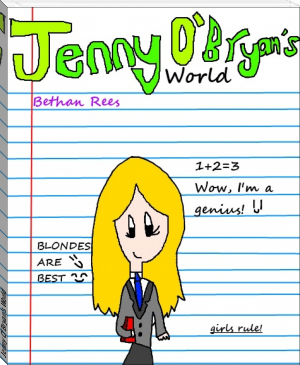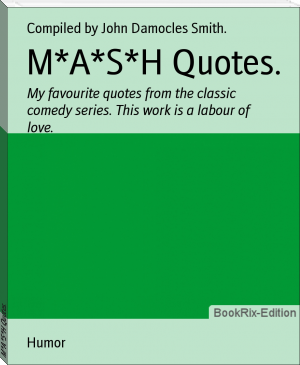The History and Records of the Elephant Club, Doesticks and Underhill [ereader with dictionary .TXT] 📗

- Author: Doesticks and Underhill
Book online «The History and Records of the Elephant Club, Doesticks and Underhill [ereader with dictionary .TXT] 📗». Author Doesticks and Underhill
"The day of the drawing at last came, and I went to the office to get my deed, for I never doubted a single instant that I had drawn the big prize. I entered the office, and told the clerk that I would take the documents.
"'What documents?' said he.
"'Why, my deed of the magnificent country mansion and farm in New Jersey, with three hundred acres of land, and a house with all the modern improvements.'
"Gentlemen, I have been, in the course of my life, kicked by a horse, knocked into a cocked hat by a threshing-machine, and had my hair singed off by chain-lightning, but neither one of these occurrences so astounded me as did that red-haired clerk, when he informed me that my ticket had drawn a gold[Pg 226] pen, with a silver holder, and a place in the top to put pencil-leads in.
"Gentlemen, I was not furious, I was perfectly cool; but when I jumped over that counter, and laid hands on that red-haired clerk, I will admit that it was my calmly-settled intention to eat that red-haired clerk for luncheon, notwithstanding his cock-eye. A hasty glance at the mud on his boots, and the metal buttons on his coat-tails, caused me to alter my original amiable intention, and I made up my mind to be gentle with him, and merely whip him so his mother wouldn't be able to tell him from a Little Neck clam on a large scale, and then leave him to live through it if he could.
"I struck him once, and he laid down in a corner among some bottles, with his head in the gas-meter, and in one minute from that time he was one universal damage.
"The proprietor being done for, I proceeded to demolish the establishment; I didn't leave, of the chairs, tables, and desks, a piece big enough to make a bird-cage, and having turned on all the gas, I was seriously debating whether I should not set the whole shop on fire, and sue for the insurance, when the two Irishmen, whom I had engaged to work my farm, made their appearance. I told them to clear[Pg 227] out, to budge, move on, leave, but they evidently took me for a swindler, and were bound to pay me off. They pitched into me; our amiable struggle to put each other's eyes out attracted a crowd; the muss became general; everybody went in, and before the policemen came there was considerable music. Nobody was bashful, and the result was four interesting cases of black eye, a pathetic instance of demolished nose, two lovely examples of swelled head, an agreeable specimen of peeled shin, seven illustrations of the beautifying power of finger-nails, when forcibly applied to the physiognomy, and three convincing exemplifications of the power of the Irish fist in extracting opposing teeth, without the aid of forceps or turnkey. The police came at last, and arrested the entire multitude. That night we slept in the station-house. I don't want to say anything against the bunks in that station-house, but this I do say, that if there ever is a bed-bug convention, and that station-house is not well represented, it won't be because any lack of population deprives them of the right to a strong delegation; and if, at any national mass meeting of fleas, they stand in need of ten or fifteen thousand to make up a quorum, the station-house of that ward can supply them, without any perceptible decrease of its entomological census.[Pg 228]
"In the morning we were conducted before the Justice, but as there were about forty cases to be heard before mine, I had ample leisure to look about, and take a realizing sense of the beauties of my situation. The case of myself and others was at length reached. The officers swore to the muss, as if the numerous broken heads were not sufficient evidence that there had been a difference of opinion. One of the Irishmen became a volunteer liar in his own behalf, but the Justice recognized him as an old customer, often brought up for drunkenness, and knowing him to be a reliable liar, he placed his evidence all to my credit, and discharged me without even a fine, but with the assurance that if I came there again he would 'send me up.' Not wanting to make any such equivocal ascension as a matter of experiment, I have kept away from him, and cut up all my subsequent monkey-shines in another ward, which is out of his jurisdiction."
After Mr. Dropper closed, there was a brief silence, in which each member quietly smoked his pipe, apparently reflecting upon the morals of lotteries. At last Wagstaff inquired who won the farm.
"I forgot that," resumed Dropper. "I learned from an advertisement which appeared in the daily[Pg 229] journals, that ticket number 6281 drew the farm. This number, you will observe, corresponds with the one I supposed would be the lucky one, except that in mine a nought was annexed to the four figures, making it 62810, instead of 6281. My mistake grew out of a misinterpretation of my dream, in respect to the bob-tailed cat, I having assumed that the diminutive nether extremity, in this instance, was equivalent to a nought expressed, whereas, if I had let it remain a nought understood, and had acted accordingly, I should have been the lucky man."
"Not so lucky as you imagine," remarked Quackenbush, "for the facts of that matter I am somewhat familiar with. A country fiddler, living up in Connecticut, held the ticket which entitled the holder to the real estate aforesaid. He saw the advertisement, and I being the only acquaintance he had in the city, he wrote to me to secure the deeds, as he couldn't raise the money to come down. I called at the office of the managers of the enterprise, and presented the ticket. They said it was all right; congratulated me on the luck of my friend, and told me to call a week from that time, and they would be prepared to execute the deed. This I thought was very fair, and I left the office. On the appointed[Pg 230] day I called, and found the office closed, as the managers had sloped."
The conversation then turned upon Police Courts, and the facilities which they afforded in aiding a person to get glimpses of the elephant. It was conceded that the experience of Dropper, just related, opened very fair, and, on the suggestion of Mr. Quackenbush, it was resolved:
1. That the members of the club do make it their business
2. To visit the Police Courts
3. Before the next meeting of the club.
The meeting was adjourned by the club, singing, "We're all jolly good fellows."

[Pg 231] "I do remember Ann—"
A. Pothecarie.
SEVERAL evenings passed before all the members of the club again assembled. In the meantime the quantity of manuscripts had become  unusually large, the members having found that the Police[Pg 232] Courts were prolific in sights of the colossal quadruped. When they did meet it was whispered that one of the members had had some personal experience, not only as a spectator but as a prisoner. No questions, however, were propounded upon the subject, in a tone loud enough for the member in question to hear, as they desired to allow him to speak of the matter voluntarily, confess his fault, and receive the forgiveness of his fellows.
unusually large, the members having found that the Police[Pg 232] Courts were prolific in sights of the colossal quadruped. When they did meet it was whispered that one of the members had had some personal experience, not only as a spectator but as a prisoner. No questions, however, were propounded upon the subject, in a tone loud enough for the member in question to hear, as they desired to allow him to speak of the matter voluntarily, confess his fault, and receive the forgiveness of his fellows.
The proceedings of the evening were opened by the Higholdboy, who took his official seat, announced that the special order of the meeting was to hear the reports of members who had been present at the sessions of the Police Courts, with the view of noting down their zoölogical features.
The Higholdboy called upon Dennis, Wagstaff, and Overdale for the result of their visit to the Police Courts. Wagstaff's notebook was produced, and the lengthened narratives inscribed therein went to show the following state of facts.
Wagstaff arose one morning at six precisely, and, after having hit Dennis with his own wooden leg, and pulled Overdale's eyes open by his whiskers and hair, announced to them if they were going to visit the Essex Market Police Court that day, to see the animals, that it was time to rise. They slipped on their clothing[Pg 233] as soon as possible, and started somewhat sooner. They passed the Odd Fellows Hall, which Overdale expatiated upon at some length as an extensive log-chain factory. He formed his conclusion from seeing three links of chain represented in a conspicuous part of the building. The Westchester House he informed them was Washington's head quarters, and under this belief they stopped some time to look at it, and speak of it in connection with the many stories related of that interesting relic of the architecture of the last century.
They arrived at length at the Essex Market, in the upper part of which the police magistrate of that judicial district sits in a big chair, for the purpose of dealing out retail justice and getting a wholesale living.
The trio ascended into the court-room, where the justice was seated, disposing of the hard cases which had accumulated during the night. Overdale was still communicative. In answer to the inquiries of Dennis, he informed that gentleman that the police clerks were associated justices, that the prisoner's cage was the jury-box, and pointed out the prisoners themselves as the jury. The humble member of the police, who is known as the doorman, Overdale said answered well the description of the Chief of the Police, contained in one of the historic works of John[Pg 234] McLenan. Dennis inquired where the prisoners were. Overdale was unable to answer, but at last expressed it as his opinion that the persons who were standing about them must "be the malefactors." Dennis said he never could satisfactorily account for the jurors being tried, and sent out of the room in charge of officers, but he had too much confidence in the extensive knowledge and vast intelligence of Overdale, to suppose that his hirsute friend could possibly be mistaken. In consequence of this misplaced confidence on the part of Wagstaff and Dennis, the notebook of the former was filled with notes of the trials of the different members of the jury.
One case of which Wagstaff took full notes, was that of Edward Bobber, a seafaring man, of very peculiar appearance, possessing some remarkable characteristics of manner, dress, speech, looks, and action. He was charged with being drunk. In the way of physical beauty, Edward was decidedly a damaged article. He had lost one arm by a snake-bite, and been deprived of an eye by the premature explosion of a pistol, which broke his spectacles at the same time it extinguished his sinister optic. The unexpected descent of a ship-mate, from the tops, upon his head, had turned his neck so that he seemed to be keeping a perpetual look out over his shoulder with his remaining eye. His nose[Pg 235] resembled a half-ripe tomato, and a pair of warty excrescences hung upon his face, as if some one had shot a couple of marbles at him, which had stuck to him for life. His complexion bore a close resemblance to the outside of a huckleberry-pudding. His teeth, which were unusually long, projected backward, as if they had taken a start to grow down his throat. This last peculiarity was, undoubtedly, one cause of a remarkable singularity of speech, which seriously impaired his natural facility of conversation. Some idiosyncrasy of disposition, probably, had also something to do with this lingual embarrassment, but certain it is, that Mr. Edward Bobber never answered one question until he was asked another, to which last he would give the reply intended for query number one. Whether his mental faculties needed always a second-interrogative punching up, or whether the fangs projecting downward retained one answer until displaced by another, Wagstaff and his friends were unable to decide; but they truly believe that an inquiry propounded to Edward Bobber, aforesaid, would have remained unanswered until doomsday, unless a second question followed the first.
A transcript of a conversation between him and the Clerk of the Court reads as follows:
"Clerk.—Where were you born?[Pg 236]
"The prisoner removed his solitary orb from its guardianship, over his left





Comments (0)